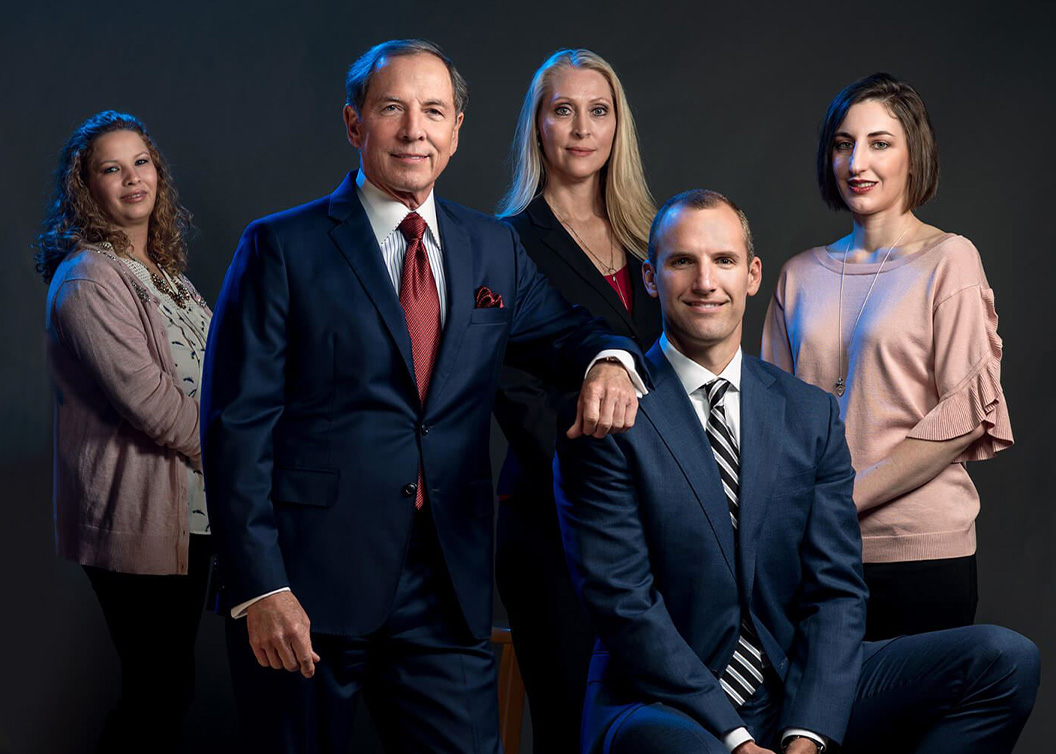
San Diego Brain Injury Lawyers
Comprehensive Legal Guidance for Brain Injury Cases in California
Our brains are the most complex organs in our bodies. Our brains control everything in our bodies. Even the simplest tasks cannot be performed without a properly functioning brain. As a result, it is essential to protect your head from a brain injury since blunt force trauma to the head can easily cause one to suffer a brain injury.
Severe head injuries refer to any injuries that harm the skull, scalp, or brain. In many accidents, the head is the most seriously injured body part. When you or a loved one suffers a traumatic brain injury, turn to the knowledgeable attorneys at The McClellan Law Firm. With more than 40 years of experience handling complex litigation and catastrophic injuries, we help victims and their families take legal action.
At The McClellan Law Firm, we put our clients first by providing excellent legal representation and personalized service when handling all brain and head injury cases. Our law firm and its serious injury attorneys are recognized throughout San Diego and the nation for excellent legal representation.
Call The McClellan Law Firm today at (619) 215-1488 or contact us online to schedule a meeting with our brain injury attorney in San Diego!
Navigating Traumatic Brain Injury Litigation
In traumatic brain injury litigation, the issues often center on the specific nature, extent, and duration of the victim's injuries. While the fact of a severe injury and the liability of a particular defendant might be well beyond dispute, the question of damages is frequently subject to intense dispute and litigation. If you or a member of your family has suffered a severe injury to the head, there will likely be a legal battle to determine the compensation you need to cover the medical, emotional, and financial costs of your injury. Brain injuries can be challenging to diagnose, and arguing these cases is often a complex task, but at The McClellan Law Firm, we have experience in these types of claims and a history of success. From calling witnesses who are experts in neurology, neuropsychiatry, neuropsychology, and psychiatry to economists and life planners who can explain the long-term costs of an injury, we are prepared to make your case clear.
Traumatic Brain Injury Statistics
In the U.S., at least 1.7 million people suffer TBIs every year.
Approximately three in four of these incidents are considered "mild" forms of TBI, such as concussions. The Centers for Disease Control and Prevention gather and publish these statistics. TBIs are very expensive for victims and their families. In 2000, medical expenses, productivity costs, and other expenditures associated with TBIs in the United States totaled about $76.5 billion.
Challenges Faced by Brain Injury Survivors and Their Families
Most brain injury survivors say they want their old lives back. However, for those who have suffered a brain injury (as well as their loved ones), getting back to their old lives can often be impossible. One man whose son suffered a traumatic brain injury in 1987 described the recovery as going "back to childhood" when he talked about some of the tasks he had to perform for his son, like changing his diaper and helping him in the shower.
Many brain injury survivors and their loved ones struggle most with the lack of information on how to cope with the condition and what steps are necessary to begin rebuilding their lives. One man claimed that he felt like he was completely on his own as soon as he left rehab. Brain injuries can change the lives of caregivers just as much as the people they care for. Assisting a loved one with a traumatic brain injury can quickly become a full-time job, putting a hold on a marriage or career, or even going as far as to impact family dynamics.
Most survivors of brain injury recognize recovery as a lifelong journey. You may need to learn to crawl again, move on to using a wheelchair, and then retrain countless physical functions most of us take for granted. While physical therapy is helpful, proper recovery from a brain injury can take years and cost thousands of dollars.
Exploring Acquired Brain Injury: Recognizing Non-Traumatic Causes and Their Impact
Not all severe brain injuries are caused by blunt force trauma, falls, or fractures. Any time blood or oxygen flow to the brain is interrupted for any reason, damage can result, leading to a loss of cognitive, sensory, or motor function. Any such brain damage attributable to a non-traumatic cause is known as acquired brain injury.
The most common causes of acquired brain injury are various forms of asphyxiation, hypoxia, or anoxia that shut off the brain's oxygen supply due either to a problem with blood circulation or to a lack of access to air.
Acquired brain injury is a common consequence of accidents such as:
- Chemical exposure at the workplace or in a confined space
- Near-drowning episodes at a swimming pool or when a boat capsizes
- Choking accidents when there is a delay in emergency assistance
Small children especially can be vulnerable to acquired brain injury caused by choking.
What are the Symptoms of Acquired Brain Injuries?
Depending on the length of time of oxygen deprivation, the extent of the acquired brain injury can be very severe and permanent. Symptoms can range from persistent headaches to profound coma.
Among the particular problems that a victim of acquired brain injury might encounter are:
- Loss of memory
- Deteriorated motor skills
- Changes in temperament or behavior
- Loss of the capacity to taste or smell
- Problems with sleep or appetite
- Inability to concentrate
- Difficulty finding words
New Research On Treating Brain Injuries
A new study indicates that brain injury symptoms may subside far before it becomes safe to resume activities. The study suggests that brain injury recovery should take two forms.
- The first mode of concussion recovery involves the memory, thinking, and behavioral symptoms
- The second mode involves the physiological condition of the brain
The study could lead to significant changes to the recovery timeline following any brain injury, even those considered "mild." The research used specialized MRI brain scans, which use a different technique from typical brain scans, to identify ongoing brain abnormalities.
A traditional CT or MRI often does not show the small changes in brain physiology and function described in the study. The study author said that lack of evidence may drive an inaccurate perception that "any persistent symptoms are psychological." A patient suffering real brain damage may be pushed back into action or have his or her symptoms ignored based on inadequate testing.
The study provides some evidence that the elevated risk of a second brain injury may persist for months after the symptoms of a first injury disappear. Athletes who return to play a matter of weeks after a head trauma may be in significant danger if a second injury occurs. More research is necessary to determine the proper course of treatment and recovery for those who have suffered concussions.
Tailored Legal Advocacy for Brain Injury Victims
Brain injuries are some of the most damaging and complex injuries an accident can cause. Traumatic brain injuries and acquired brain injuries significantly affect the victim and may not ever allow him or her to fully recover from the accident. Severe brain damage may also occur as a result of a severe head injury. It is important to know that even if full recovery is not possible, there are options for long-term care and treatment that may help the victim improve his or her quality of life. These options, however, are very expensive.
Someone who suffers a severe brain injury in an accident may file suit against the at-fault party for:
- Lost wages
- Pain and suffering
- Loss of consortium
- Past, present, and future medical expenses
- Past and future loss of enjoyment of life
- Other non-economic and economic damages
Attorneys must understand the types of brain injuries, their symptoms, the treatment options, and long-term care needs. This knowledge of complex head injuries is learned only by working with clients and families of victims who have suffered severe brain injuries first-hand, as the effects of brain injuries will differ.
Time Limits for Filing Brain Injury Claims in California
When pursuing a brain injury claim in California, it's important to understand the statute of limitations. This legal timeframe dictates when you must file your lawsuit. In California, you generally have a two-year period from the date of the injury to initiate a personal injury claim, including those involving brain injuries.
This two-year window means that victims must take action quickly to preserve their rights to seek compensation for medical expenses, lost wages, and other damages related to their injury. However, specific exceptions to this rule can extend or alter the filing period. For example, if the injured party is a minor, the statute of limitations may be extended, allowing them to file a claim until they turn 18. In instances where the injury is not immediately apparent, such as with specific brain injuries, the victim may have one year from the date of discovery to file a claim.
Due to the complexities surrounding the statute of limitations, it's crucial for individuals affected by a brain injury to consult with an experienced attorney immediately. Taking timely legal action is vital to ensure you don't forfeit your right to seek compensation for your hardships.
Contact Our San Diego Brain Injury Attorney Today
At The McClellan Law Firm, we have more than two decades of personal injury experience. With each brain injury case we have handled in more than 30 years, we have gained important medical and legal knowledge that we will use in representing you or your loved one following a severe brain injury accident.
Contact The McClellan Law Firm today to schedule a meeting with our brain injury lawyer in San Diego!
For over 30 years, The McClellan Law Firm has been dedicated to helping clients across California secure justice and protect their futures. Founded by renowned attorney Craig R. McClellan, the firm has earned a reputation for excellence and integrity in the legal field. With decades of experience and a commitment to achieving results, we pride ourselves on providing exceptional representation and unwavering support to every client we serve.



-
 Craig McClellan is a member of the Inner Circle of Advocates, an invitation-only group of the top 100 plaintiff trial lawyers in the United States.
Craig McClellan is a member of the Inner Circle of Advocates, an invitation-only group of the top 100 plaintiff trial lawyers in the United States. -
 Craig McClellan was voted Lawyer of the Year for Product Liability Litigation by Best Lawyers for 2025.
Craig McClellan was voted Lawyer of the Year for Product Liability Litigation by Best Lawyers for 2025. -
 The firm earned a Tier 1 ranking in Personal Injury in the 2025 list of the Best Law Firms.
The firm earned a Tier 1 ranking in Personal Injury in the 2025 list of the Best Law Firms. -
 Craig McClellan earned one of the top 10 medical malpractice settlements in California, securing a $9,000,000 settlement for a client.
Craig McClellan earned one of the top 10 medical malpractice settlements in California, securing a $9,000,000 settlement for a client. -
 Craig McClellan & Conor Hulburt earned one of the top 10 premises liability settlements in California, securing a $3,175,850 settlement for a client.
Craig McClellan & Conor Hulburt earned one of the top 10 premises liability settlements in California, securing a $3,175,850 settlement for a client. -
 Craig McClellan has been selected to the list of Super Lawyers every year since 2007, and earned the most votes of ANY lawyer for 2019 in San Diego.
Craig McClellan has been selected to the list of Super Lawyers every year since 2007, and earned the most votes of ANY lawyer for 2019 in San Diego. -
 Craig McClellan was voted Lawyer of the Year for Product Liability Litigation by Best Lawyers for 2019.
Craig McClellan was voted Lawyer of the Year for Product Liability Litigation by Best Lawyers for 2019. -
 Craig McClellan is listed as one of America’s Top 100 High Stakes Litigators in Business Litigation, Personal Injury, and Product Liability.
Craig McClellan is listed as one of America’s Top 100 High Stakes Litigators in Business Litigation, Personal Injury, and Product Liability. -
 Attorney McClellan has a 10/10 “Superb” rating, the highest rating an attorney can receive from Avvo.
Attorney McClellan has a 10/10 “Superb” rating, the highest rating an attorney can receive from Avvo. -
 The firm has an A+ rating from the Better Business Bureau, the highest possible rating offered by the organization.
The firm has an A+ rating from the Better Business Bureau, the highest possible rating offered by the organization. -
 Attorney McClellan is a member of the Consumer Attorneys of San Diego, and previously served on its Board of Directors.
Attorney McClellan is a member of the Consumer Attorneys of San Diego, and previously served on its Board of Directors. -
 Attorney Craig McClellan was named as one of the “Best Attorneys” by the Los Angeles Times.
Attorney Craig McClellan was named as one of the “Best Attorneys” by the Los Angeles Times. -
 Attorney Craig McClellan was named one of the “Best Lawyers” by San Diego Metro.
Attorney Craig McClellan was named one of the “Best Lawyers” by San Diego Metro. -
 Attorney Craig McClellan was named one of the Top Lawyers in San Diego in Business Litigation by San Diego Magazine.
Attorney Craig McClellan was named one of the Top Lawyers in San Diego in Business Litigation by San Diego Magazine. -
 Craig McClellan has been named among the Lawdragon 500 Leading Plaintiff Consumer Lawyers, which honors the nation’s top advocates.
Craig McClellan has been named among the Lawdragon 500 Leading Plaintiff Consumer Lawyers, which honors the nation’s top advocates.

-
“I swear they work 24/7! And most importantly, we knew that they truly cared about us and the outcome. They fought for our family and have given us the piece of mind that our son's healthcare will always be covered.”S.P.
-
“We will NEVER forget what you did for us Craig. We are FOREVER GRATEFUL.”K.V.
-
“We wouldn’t be here, in this moment of life without the kindness and professionalism of you all and how you went to bat for us! Eternally grateful!”A.K.


.2412171328362.png)
.2411141136156.png)



.2411141143453.png)






.2411141148140.png)